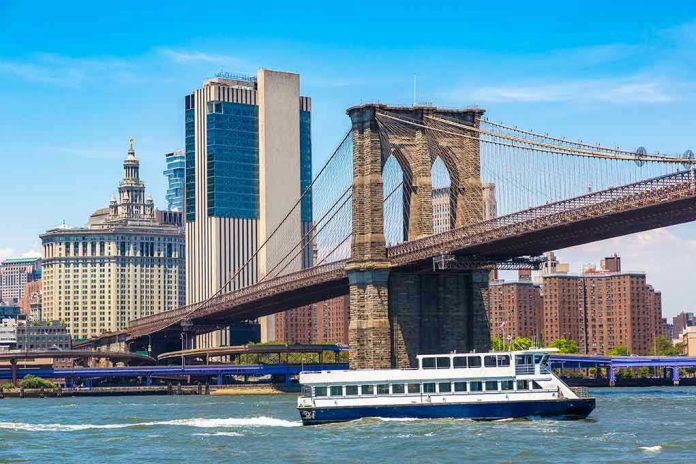
The father of New York City mayoral candidate Zohran Mamdani sits on the advisory council of a group linked to anti-Israel extremism and individuals with terror ties, sparking outrage as this connection now casts a shadow over one of the city’s most contentious election cycles in years.
At a Glance
- Mahmood Mamdani, a Columbia professor and advisor to the Gaza Tribunal, is under fire for his ties to anti-Israel activism and controversial academic writings.
- The Gaza Tribunal’s leadership includes figures with documented links to extremist rhetoric and organizations, fueling allegations of terror sympathies.
- Zohran Mamdani’s mayoral campaign faces mounting scrutiny over familial and ideological associations with the BDS movement and anti-Israel initiatives.
- Jewish and pro-Israel organizations warn of rising antisemitism and call out the normalization of anti-Israel rhetoric in mainstream politics.
Gaza Tribunal’s Terror-Linked Council: The Web Behind the Curtain
The Gaza Tribunal, launched in London in 2024, claims to be a “civil society initiative” aimed at exposing what it calls “genocide” in Gaza. Its real mission? Mobilizing a global chorus to demonize Israel by any means necessary, no matter how outrageous or historically ignorant. The Tribunal’s advisory council reads like a who’s who of fringe activism—individuals not only committed to the delegitimization of Israel, but also, in some cases, linked to outright terror organizations.
Mahmood Mamdani, a Columbia University professor and the father of NYC mayoral hopeful Zohran Mamdani, is among the most controversial members of this council. His past writings have described suicide bombers as “modern political actors,” a stance that has rightfully triggered outrage and concern among anyone with even a shred of moral clarity. The Gaza Tribunal’s president, Richard Falk, is a former UN official infamous for peddling anti-Israel conspiracy theories. Other members include Sami Al-Arian, who admitted aiding Palestinian Islamic Jihad before being deported from the United States, and Hatem Bazian, whose inflammatory rhetoric is legendary even by activist standards.
From the Ivory Tower to City Hall: Political Fallout Hits NYC
The impact of these associations is not confined to international activism or obscure academic debates. With Zohran Mamdani now running for mayor of New York City, these connections have leapt into the public and political crosshairs. NYC is home to the largest Jewish population outside of Israel, making any candidate’s ties to anti-Israel activism a matter of urgent concern for tens of thousands of voters. As scrutiny intensifies, Jewish and pro-Israel groups are raising alarms about the normalization of antisemitism and the dangerous blurring of lines between academic “critique” and outright endorsement of terror-linked rhetoric.
Zohran Mamdani, for his part, openly supports the Boycott, Divestment, and Sanctions (BDS) movement—a campaign that seeks to punish Israel economically and diplomatically. The Gaza Tribunal, meanwhile, frames BDS as a “solidarity initiative,” ignoring that the movement’s ultimate aim is not peace, but the isolation and destruction of the world’s only Jewish state. These positions are not lost on NYC voters, many of whom are rightfully fed up with politicians who seem more interested in pandering to fringe activists than protecting the safety and values of their own constituents.
A Movement with a History—and an Agenda
The Gaza Tribunal draws inspiration from the so-called “people’s tribunals” like the Russell Tribunal on Vietnam and Palestine, efforts that made headlines for their one-sided theatrics but accomplished little in the way of genuine justice. What sets the Gaza Tribunal apart is its open embrace of individuals with terror ties and its willingness to legitimize violent tactics so long as the targets are Israelis. The Tribunal’s stated goal is to “awaken civil society to its responsibility and opportunity to stop Israel’s genocide in Gaza”—language that deliberately inverts victim and aggressor, and erases the very real threat posed by groups like Hamas.
Let’s be clear: the Tribunal is not about accountability, but about providing academic and political cover for those who despise the existence of Israel. Its sessions—planned for cities like Sarajevo and Istanbul—are designed as media spectacles, not genuine forums for impartial investigation or peace-building. The BDS movement, championed by the Tribunal’s leadership, has been widely condemned by bipartisan majorities in Congress and branded as antisemitic by watchdog groups from the Anti-Defamation League to the Simon Wiesenthal Center.
The Road Ahead: Polarization, Politics, and the Fight for Common Sense
The backlash against the Gaza Tribunal and its American political affiliates is only just beginning. As New York’s mayoral election heats up, expect to see more voters—and not just Jewish voters—demanding answers about why a candidate’s family is involved in groups that defend suicide bombers or consort with individuals linked to terror. This issue isn’t about free speech or academic freedom; it’s about basic decency and the security of our communities.
If there’s one thing this episode demonstrates, it’s that the American public is sick and tired of elites—whether in academia or politics—making excuses for extremism, so long as it serves their ideological agenda. The Gaza Tribunal’s antics, and the political ambitions of its members, are a reminder that defending the constitution, our allies, and our core values is not just a talking point, but a necessity. The voters of New York have a choice: reward those who coddle extremism, or demand leaders who stand up for America, Israel, and the truth.




